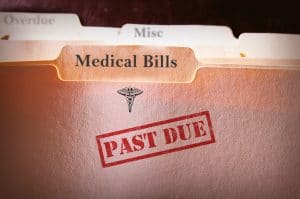
In regard to personal injury settlements, most personal injury settlements are inclusive of the medical bills or medical liens. This means, you, the injured victim, may have the responsibility to pay these bills or liens out of your personal injury settlement! You can’t just assume that if the insurance company is attempting to settle with just you and that they will pay your medical bills. In fact, most car wreck settlements handled by the Desmond Law Office are exclusive of the no-fault lien but INCLUSIVE of all other liens. This means Medicaid liens, Medicare liens and health insurance liens have to be paid out of the personal injury settlement.
So, if you are trying to resolve a claim from an automobile wreck without an attorney, you have to realize that any personal injury settlement probably includes all of your medical bills; which means you, the injured victim of a car wreck, will be the one responsible for paying these medical bills. However, for Kentucky car wrecks, one of the few exceptions is the medical bills paid by the Kentucky no-fault carrier.
Kentucky car wreck settlements are generally exclusive of the no-fault lien; which means that they do not include the bills paid by the no-fault carrier. In other words, the at-fault carrier will have to pay the no-fault carrier back for the medical bills paid on your behalf. It is called a subrogation claim.
So, when one of my clients signs a personal injury release, they are resolving their personal injury claim completely, and the legal release will typically say “exclusive of the no-fault lien but inclusive of any and all other liens that may or could be asserted including by Medicaid and Medicare.” Let me use an example to explain this and show the risks involved when liens are not dealt with in personal injury settlements.
Assume a client had $19,000 in medical bills ($9,000 Emergency Room bill and $10,000 from chiropractic treatment). The client’s insurance carrier is the no-fault carrier and assume they paid the chiropractor the full $10,000 in PIP or no-fault coverage. The remaining $9,000 was paid by Medicaid, the client’s health insurance.
Medicaid, by contract, only had to pay $3,000 to satisfy the $9,000 Emergency Room bill. By statute/law, Medicaid has a lien against any personal injury settlement received by my client. Think of it this way, health insurance carriers will agree to pay your medical bills if you were injured in a car wreck but if you recover money from the car accident, they have the right to recover from you. This is called a subrogation claim or a right of reimbursement.
So, if the medical bills far exceed the available insurance coverage, a client can potentially benefit by having his/her health insurance pay the medical expenses and then address their lien out of the settlement. Why? Because the health insurance carrier reduces the medical bills, by contract with a medical provider, and the health insurance carrier’s right of recovery is the amount they paid, not the amount of the medical bill.
However, the lien of the health insurance carrier must be addressed in the personal injury settlement. Otherwise, a client could be sued for that lien after the settlement was disbursed to them. So, in the above example, a typical personal injury settlement might look like this:
SETTLEMENT SUMMARY
CLIENT: Client DATE: January 27, 2020
I, James D. Desmond, have been honored to serve as your attorney. I hope you will keep me in mind for all your legal needs. I am here to assist you whenever possible. In turn, please keep in mind that you are an essential part of this legal practice. In short, if you were pleased with my services, I am relying on you to send your family and friends my way. I will do my best to make sure that they are well taken care of.
Gross Settlement or Award: $19,000
Attorney Fees $6,327 (33.33% Attorney’s Fee)
Costs of Prosecution $Waived
NO CHARGES FOR FAXES, STAMPS, OR PHONE CALLS
Funds to be disbursed on behalf of the Client:
Anthem $1,951.41
TOTAL DEDUCTIONS $
NET AMOUNT TO CLIENT $10,721.49
I understand that any bills or expenses owed, but not listed above, are my responsibility.
Desmond Law Office may discard any part of my entire file within 30 days after this date.
Have Seen and Agreed To:
_______________________
Notice that Settlement Summary shows that the health insurance lien is included and that money, from my Firm’s escrow account and my client’s personal injury settlement, will be paid to satisfy this lien. However, the personal injury release will typically say that the settlement is exclusive of the no-fault lien which means that the insurance carrier will be paying another $10,000, for the PIP subrogation claim, directly to my client’s insurance company as well.

